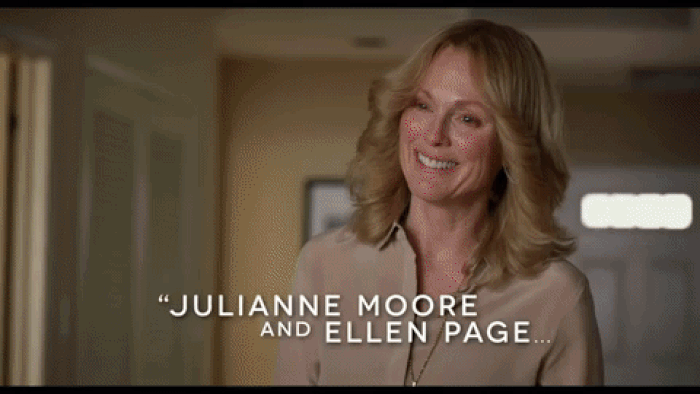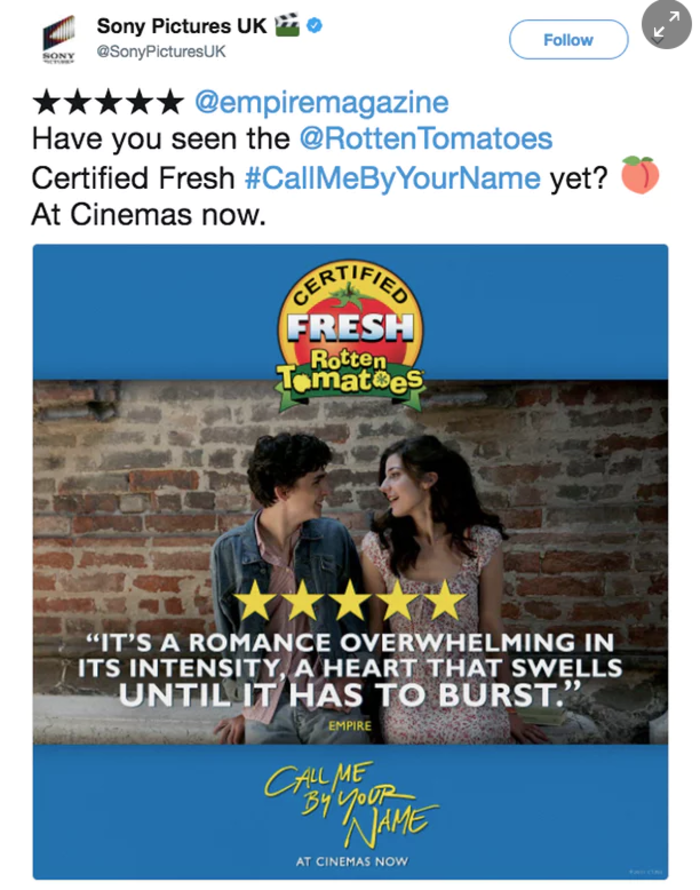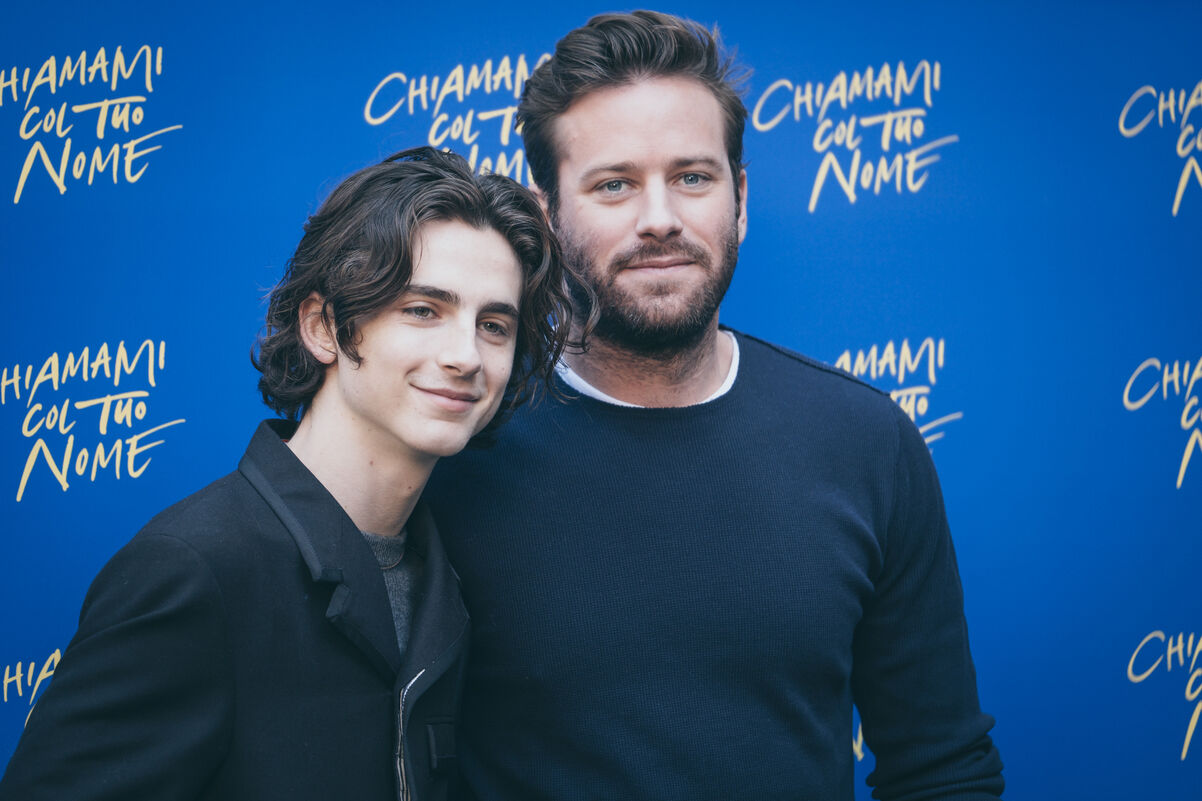Last week, IndieWire wrote a piece hypothesizing why Call Me By Your Name has not seen the success it deserves and was expected to have. Among the site’s arguments were that Sony Pictures Classics waited too long for the wide release, that the release wasn’t big enough (the film just went into 800 theaters nationwide at the end of January), and that it simply wasn’t marketed enough.
“Did they adequately do marketing and outreach to core groups interested in the film?” the writer posed, and the answer is quite simply “No.”
After poor sales in 815 theaters nationwide, Call Me By Your Name was taken out of more than 230 theaters in its second weekend of wide release, signaling that Sony is somehow not doing right by the film which has been widely well-received by critics and fans alike.
Perhaps it has more to do with its direct reach (or lack thereof) into the queer community a film like Call Me would and should appeal to. Despite publicists wanting LGBTQ outlets to cover the film, somehow, the stars, writer, and director are strangely unavailable, save for the cover of OUT, which boasted interviews with Armie Hammer, Timothée Chalamet, and out filmmaker Luca Guadagnino. OUT is frequently lambastedfor the same reason they get the coverage in the first place: They give (usually straight) stars the cover. But if that’s the only way they are granted these all-star interviews, it’s a double-edge sword.

For some publicists or studios, giving one or two “gay” interviews is assumed to reach the entire community, whom, it seems, they also believe will simply go see any gay-themed film because it’s gay; as if we aren’t to be wooed or played to as much as the wider heterosexual world of cinephiles. In terms of other LGBTQ-specific outlet coverage, only one other LGBT publication (a local called Rage Monthly) was given access to Call Me‘s stars, outside of properties associated with OUT (The Advocate). This was confirmed with the film’s PR company, 42 West, who said they held screenings for LGBTQ critics and writers (GALECA, WGA LGBT, and GLAAD), but those were not accompanied by interview or press opportunities with the true selling points of any major filmits stars and/or director.
Interestingly, 42 West claimed they invited another prominent digital LGBTQ outletto cover a carpet, but that outlet’s editorial director said that wasn’t the casethat their writer was invited to a screening but not given any carpet access. Still, it’s worth noting that even whenLGBTQ outlets are invited to cover carpets, theyare often relegated to the end and not always given interviews, even if they’ve been waiting the same amount of time as larger or mainstream outlets.
This is sadly not so uncommon when it comes to large studio films about LGBTQ themes. While I was Editor in Chief of AfterEllen, at the time the biggest site for and about LGBTQ women, we were given little access to lesbian-themed films like Carol and Freeheld despite being asked to cover them and, in the case of the latter, provide a quote for the movie trailer.

Stars Ellen Page and Julianne Moore were on the cover of OUT, but they did not appear in a lot of LGBT-specific media, including international digital outlets or local LGBT newspapers. (For the record, Page did speak with Metro Weekly, DC’s LGBTQ publication.) Carol stars Rooney Mara, Cate Blanchett, and Sarah Paulson were also unavailable for LGTBQ-specific media despite the film’s blatant lesbian storyline.
Often I wondered if this was my own experience, specifically as a lesbian journalist covering films or pop culture of interest to or representing queer women, but I found that it’s sadly a kind of phenomenon for many minority reporters who report on and for specific communities.
It’s increasingly frustrating when publicists send endless amounts of press releases touting interview possibilities only for LGBTQ outlets to be turned down (although they will never specify the reason). This is a hypothesized trend, but one that I am finding is likely the case, with Call Me By Your Name‘s failure the latest test. It would seem that directly reaching out to a community being represented in a film might be the ideal scenario, and some films have done this well, and been rewarded for it.
Moonlight, for example, made its cast and crew readily available before winning the Oscar for Best Picture and taking home $65 million at the box office. The Danish Girl reached out to LGBTQ outlets, specifically, for early screenings and press opportunities with stars even bigger than Hammer and Chalamet (Eddie Redmayne and Alicia Vikander, respectively). The Danish Girl reached $64.2 million at the box office, and also won Vikander an Academy Award for Best Supporting Actress.
Carol‘s gross was $40.3 million, and did not win any of the six categories they were up for. By comparison, Call Me By Your Name has only made $17.8 million and is not likely to win in their respective Oscars outside of quite possibly Adapted Screenplay.
This isn’t just about LGBTQ-specific media being left out of movies representing its own community. Black journalists and critics recently started a discussion about being left out of Black Panther press opportunities, with entertainment journalist Jaleesa Lashay asking Sterling K. Brown about publicists ignoring black reporters when it comes to access to and for black-related TV and film actors and projects.
“Are you aware,” she asked, “of the disparities between the opportunities given to black journalists in comparison to our white counterparts? And do you think there’s any plan in Hollywood to make sure that the media room starts to reflect the diversity that we’re beginning to see in the industry?”
A similar scenario happened, too, when a Filipina reporter,Yong Chavez, shared with Darren Criss that she wasn’t able to get access to him despite his playing a Filipino character in American Crime Story. In response, Criss emailed his publicist from her phone, requesting they set something up.
When I told #DarrenCriss that I couldn’t cover/was declined creds to premiere of ACS:Versace w/c stars & tells struggles of a Fil-Am family seldom seen on TV, he took my phone & emailed the publicists. #speechless #PinoyPride @AsiansInHollywd @CAPEUSA pic.twitter.com/wreyde0oJn
— Yong Chavez (@yongchavezLA) January 8, 2018
Just how “aware” are stars, writers, or directors? Probably not very. Brown’s response to the reporter signaled this.
“I’m taking a look around the room,” he said in a room full of reporters. “You have a point there are a lot of white people. I never paid attention and shame on me for not having done so but maybe this conversation is the beginning of something. When you’re young there comes a point when you have a conversation about how you have to work twice as hard to get just as far. I don’t know if that holds true exactly right now, but it’s something that is etched and burned into my mind. To be able to receive similar opportunities the latitude for mistakes is less…. Making sure everyone’s voice can be heard is important. Thank you for bringing it up to me. I’m sorry I hadn’t paid attention.”
The #BlackPressMatters movement has continued to be a focus of conversation, asking Black celebrities to help bring more attention to POC-focused and ran outlets. But when the stars of an LGBTQ-themed film are straight, it’s hard to say how aware they are of what those kinds of community outlets look like.
It’s more of a studio or publicist problem of subtle (and sometimes, not so subtle) homophobia, racism, and classism in the way they blatantly ignore or block out a specific subset of outlets dedicated to a minority, despite that minority being a part of the story you are looking to sell on screen. It truly begs the question why stars like Hammer or Brown or Criss are only offered to mainstream outlets, because sometimes, even outlets that have a smaller readership than a niche one will gain access because they are thought to have a “wider” audience.
There’s also the issue that mainstream outlets might not offer the same perspective, nor ask the same questions, of a film that reflects a specific experience. Perhaps that’s what publicists are trying to avoid altogether, as much of the press devoted to LGBTQ-themed films have the cast and crew alike talking about how “universal” a story is rather than how queer or black or Filipino it may be. There are certainly LGBTQ journalists and allied reporters/writers who are able to tackle these kinds of films through a queer lens, but if a film is a love story about two men, directed by a gay man, why wouldn’t a publicist or studio’s first thought be to go directly to those consumers?
Hollywood still seems to operate under the idea that gays and lesbians are going to go see any and every representation of themselves on screen because there are so few options; as if it’s a given. But for those who are unaware that a film like Call Me By Your Name even exists, or that it is coming to their local theater and when, how can the community be expected to show up and show its support? Because we will certainly be the first to blame when a queer-themed film suffers, and the ones to lose out because studios will decide they’ve wasted their money and time creating a “niche” film in the first place.
It also seems that studios, marketing teams, and publicists place a higher focus on making a “gay film” appealing to heterosexuals, thus Call Me By Your Name‘s bizarre ad in the UK that many called out for its straightwashing.

“Why would movies like these redact their leads’ queerness?” asked Salon last year. “It’s because movies starring straight white men about the lives of straight white men play better with Oscar voters, who tend to like movies more when the characters look like them. As of last year, the Los Angeles Times reported that 91 percent of Oscar voters are Caucasian and 76 percent are male; the average member of the Academy of Motion Pictures Arts and Sciences is 63 years old. Since 2011, 65 percent of best picture winners featured protagonists who mirror that exact demographic.”
That’s why late night or daytime talk show interviews Hammer and Chamalet play up to their being buddies as to make the “no homo” very clear, even on Ellen. But perhaps it’s also why LGBTQ outlets are not given access to stars, as they might *gasp* ask some more queer-themed questions about a queer work. And since most of the time, actors playing queer roles in major motion pictures are not LGBTQ-identified, is it because publicists and studios are worried about what kind of “gay” questions will be asked of their straight stars? That the conversation would be too gay?
It would seem like a no-brainer that the powers that would be would cater to the communities they are saying they represent while looking to scoop up Oscar nods and GLAAD nominations alike. Is it that they are concerned about being “too gay” or “too niche”? Whatever the reason, it’s hurting their ability to reach anyone, by attempting to please everyoneand by everyone, that usually means leaving out minorities who are expected to show up because they are so starved for representation.
“This year’s box office success of Get Out, Hidden Figures and Girls Trip proved to Hollywood that yes, films with black casts can become blockbusters (something that has been showcased before but largely ignored),” writes Benjamin Lee of The Guardian in a piece about Call Me By Your Name‘s marketing campaign in the UK. “But a gay equivalent of this scale is yet to show the industry that films, and their marketing campaigns, can be left intact and authentic without affecting the bottom dollar.”
Sadly, it won’t be because of the LGBTQ community; but the community will be the one affected most when our stories are continually inaccessible and dictated to us by straight people who offer us crumbs and expect us to salivate.
Header photo by Luca Carlino/NurPhoto via Getty Images
Don't forget to share:
Help make sure LGBTQ+ stories are being told...
We can't rely on mainstream media to tell our stories. That's why we don't lock our articles behind a paywall. Will you support our mission with a contribution today?
Cancel anytime · Proudly LGBTQ+ owned and operated
Read More in Culture
The Latest on INTO
Subscribe to get a twice-weekly dose of queer news, updates, and insights from the INTO team.
in Your Inbox













